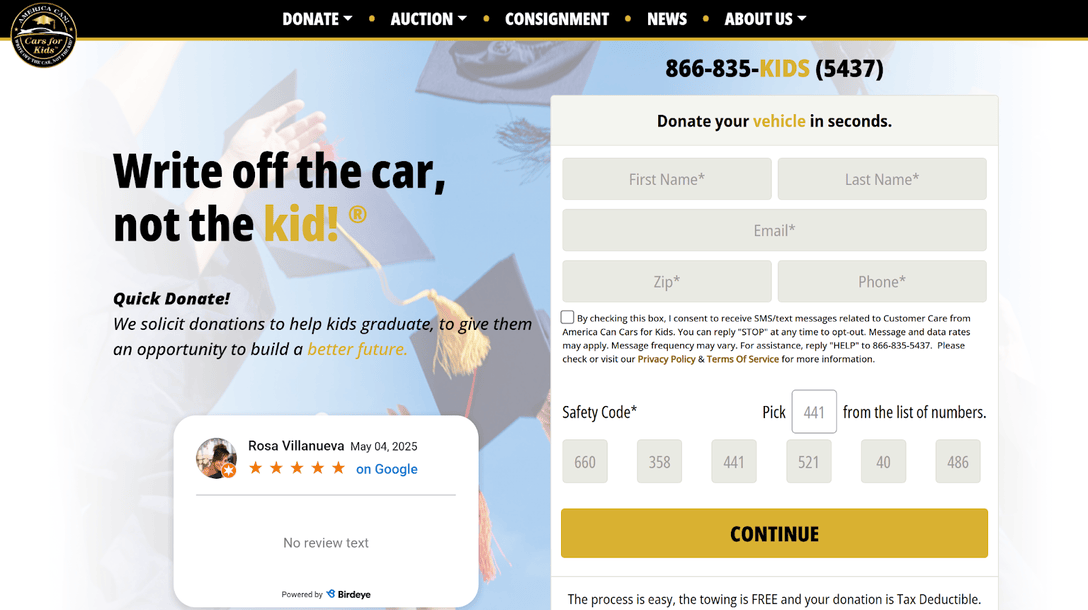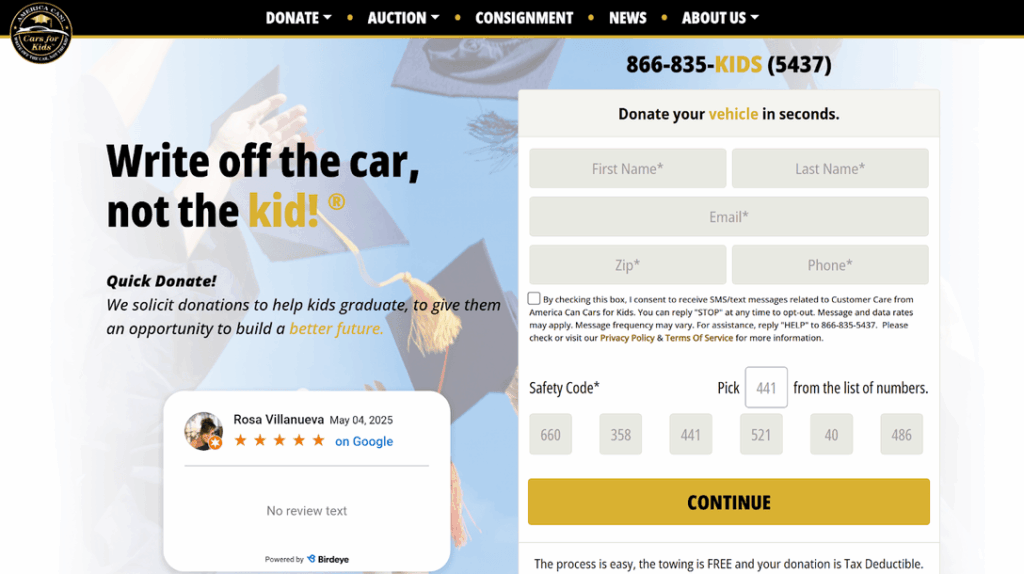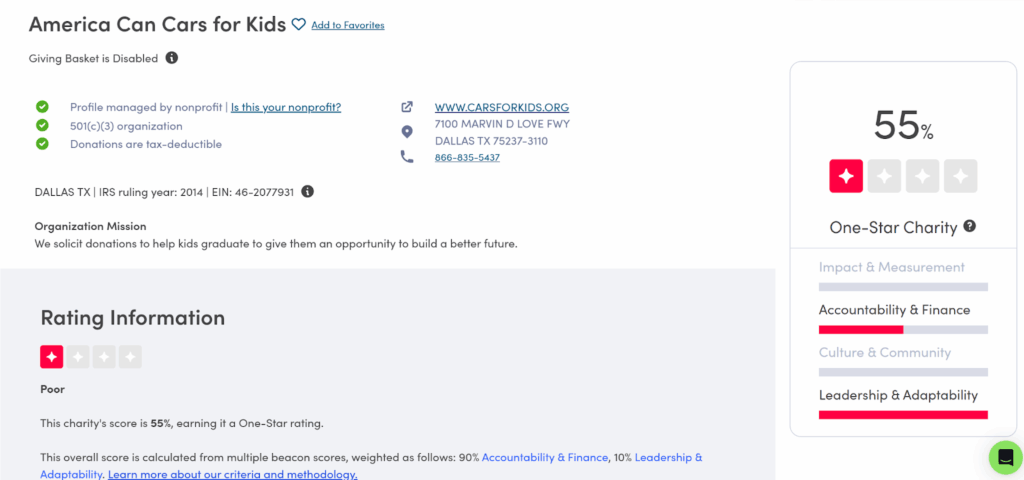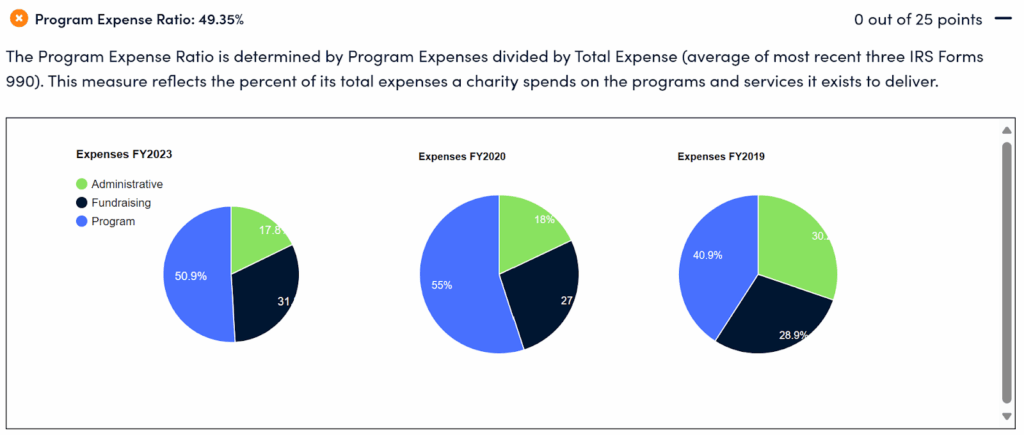Is Cars for Kids a Scam?
Laura Martisiute
Reading time: 6 minutes

Table of Contents
If you’re thinking of donating to Cars for Kids, you need to know if it’s safe. Is Cars for Kids a scam?
Below, we explain whether Cars for Kids is a scam and discuss some steps you can take to improve your safety when donating to this nonprofit.
What Is Cars for Kids?
Cars for Kids is a nonprofit organization based in Dallas, Texas, that turns car donations into resources that can improve children’s lives.
You can donate vehicles, including cars, trucks, motorcycles, boats, and RVs (running or not), to Cars for Kids. The nonprofit will provide free towing throughout the US, issue you a 1098C IRS tax deduction form to file with your taxes, and give you a $50 Visa Gift Card.

Cars for Kids provides grants to Texans Can, an organisation dedicated to helping kids graduate from high school and build better futures.
The organization was founded in 1992.
All net proceeds from donations are claimed to go directly to programs supporting food, housing, education, and other essentials for youth.
According to its website, Cars for Kids is an IRS-approved, tax-exempt, 501(c)(3) charity (Tax ID #46-2077931).
Is Cars for Kids a Scam?
No, Cars for Kids is not a scam. It’s a legitimate nonprofit organization.
There aren’t many reviews available on Cars for Kids. That said, the reviews it gets are positive:
- 4.4 out of 5.0 stars (from 435 reviews) on Google.
- 5.0 out of 5.0 stars (from 156 reviews) on Great Nonprofits.

However, Cars for Kids receives only 55% out of 100%, or 1 out of 4 stars, on Charity Navigator. Charity Navigator is a nonprofit online platform that rates charities based on factors such as financial health, accountability, and transparency.
According to Charity Navigator, Cars for Kids currently falls down on several ‘Financial Metrics,’ including:
- Liabilities to Assets Ratio (11.11%), which indicates an organization’s solvency and/or long-term sustainability.
- Program’s Expense Ratio (49.35%), which is the percent of its total expense spent on the programs and services it exists to deliver.

- Fundraising Efficiency Ratio ($0.31), which is the amount spent to raise $1 in charitable contributions.
- Working Capital Ratio (0.54 years), which determines how long a charity could sustain its level of spending with its net available assets or working capital.
Charity Navigator also provides data on the salaries of key persons within Cars for Kids.
Cars for Kids is often confused with Kars4Kids, another nonprofit organisation that offers a car donation program. In fact, if you search for “Cars for Kids,” you’ll likely get results for Kars4Kids.
In 2024, a federal appeals court ended a decade-long trademark battle between Kars4Kids and America Can! Cars for Kids by ruling that America Can waited too long to sue, allowing Kars4Kids to keep using its brand nationwide without paying damages, though the Texas charity is considering an appeal.
Cars for Kids Security
In its privacy policy, Cars for Kids describes some of its security measures.
It says it has a “range of physical, technical, and administrative measures” in place to protect your personal information.

These measures include encryption, secure servers, and access controls.
Cars for Kids Privacy
Cars for Kids explains the kind of data it collects, for what purposes, and with whom it shares it in its privacy policy.
It collects the following information:
- Voluntarily provided information, such as your name, email address, phone numbers, address, and billing and/or credit card information.
- Information automatically collected when you visit the Cars for Kids site, which may include cookies, third-party tracking technologies, and server logs.
- Non-personal anonymous demographic information, such as gender, age, political affiliation, household income, race, religion, browser type, IP address, and operating system type.
Cars for Kids may also analyze user browsing behavior to understand consumer interests and potentially tailor its services, marketing, or advertisements accordingly.
The charity collects the above information to provide requested services, process donations, improve website functionality and user experience, send promotional communications (only with consent), conduct surveys and market research, and customize website content based on user behavior.
It may disclose personal information when required by law (e.g., subpoenas, court orders), to service providers (e.g., payment processors, email platforms), and to enforce terms of service or protect Cars For Kids’ rights.
Cars for Kids may also disclose your data in aggregated, anonymized forms where your identity is protected.
It says it doesn’t sell, rent, or lease your data to third parties.

If you opt in to SMS, you may receive:
- Appointment and donation confirmations.
- Fundraising campaign updates.
- Event invitations and reminders.
The charity does not sell or share phone numbers for marketing. You can also opt out anytime by replying “STOP.”
Cars for Kids will retain your information “for no longer than necessary”. The length of time varies based on factors such as how long your personal data remains relevant; however, the nonprofit does not provide specific timeframes.
You can access, update, or delete your personal information by contacting Cars For Kids.
So, Should You Donate to Cars for Kids?
Depends.
If your primary goal is to easily dispose of an old vehicle while receiving a small perk and a tax form, then Cars for Kids can be a good option.
However, if your primary goal is to maximize the charitable impact of your donation, you may want to look at organizations with a higher rating on Charity Navigator.
How to Use Donate to Cars for Kids Safely and Privately
- Don’t share unnecessary data. Only provide the details needed to process the donation.
- Use a dedicated email address. Consider creating a separate email address just for donations to avoid future marketing emails.
- Use a masked phone number. That way, you can keep your actual phone number private.
- Opt out of marketing communications. Cars for Kids allows you to opt out of promotional emails, texts, and calls, so be sure to uncheck any consent boxes.
- Request confirmation receipts. Ensure you get the 1098-C IRS tax form and keep it for your records.
- Use a privacy-focused browser when visiting the Cars for Kids website. This helps you minimize tracking.
- Block third-party cookies. Cars for Kids uses tracking technologies, so turn on your browser’s tracking protection.
- Consider alternative nonprofits if impact matters. Cars for Kids spends approximately 49% of its budget on programs (according to Charity Navigator), meaning that less than half of the donations go directly to charitable services. If maximizing impact is important to you, compare other highly rated vehicle donation programs.
- Request deletion of your data. After donating, contact Cars for Kids and request the deletion of your personal data.
Our privacy advisors:
- Continuously find and remove your sensitive data online
- Stop companies from selling your data – all year long
- Have removed 35M+ records
of personal data from the web
Save 10% on any individual and
family privacy plan
with code: BLOG10
news?
Don’t have the time?
DeleteMe is our premium privacy service that removes you from more than 750 data brokers like Whitepages, Spokeo, BeenVerified, plus many more.
Save 10% on DeleteMe when you use the code BLOG10.

















